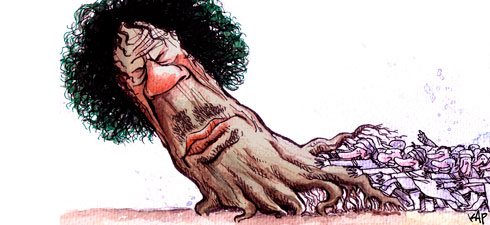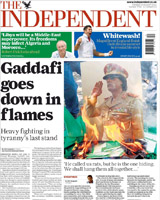
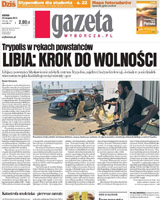
His more sceptical colleague from Rczeczpospolita, Marek Magierowski, believes that “the EU may advise Libya on how to organise free elections and how to create a system of political parties, or support them financially. Sooner or later, though, the advisers will head back to Brussels, the money will run out and Libya will be left to its own devices. The process will be a very painful one, since, like Afghanistan, Libya is a composite state, a constellation of 150 tribes with their own interests. A democratic and peaceful Libya is an attractive prospect, but seems a distant one.”
In The Independent, the Middle East correspondent Robert Fisk asks whether Libya’s future will be very different from its past. Certainly, Fisk writes, one can imagine Libya as “a Middle Eastern superpower” and a country “less African and more Arab” that “may infect Algeria and Morocco with its freedoms.” But Libya, Fisk continues, has long “suffered from the cancer of the Arab world: financial – and moral – corruption.” That is why its new “unelected” leaders should be monitored carefully.
According to Fisk, Libya will not be the last country to feel the effects of the “Arab Spring”: Bahrain, Saudi Arabia, Jordan, Yemen, and especially Syria are next on the list. For, he asks, “how long will it be before the people of Europe demand to know why, if Nato has been so successful in Libya...it cannot be used against Assad's legions in Syria, using Cyprus as a territorial aircraft-carrier”?
For Der Spiegel, the rout of Gaddafi is a “triumph for Sarkozy” and “a disgrace for Merkel”. “The government had absolutely no desire to take part in the military action against Gaddafi's dictatorship,” the magazine writes, “and now we know just how dreadful this decision was.” The fate of the Gaddafi regime is a “success for Nicolas Sarkozy, the Americans and the British,” Der Spiegel confirms, adding that “Germany's credibility as a defender of human rights and its reputation as a reliable partner have both taken a hit.”
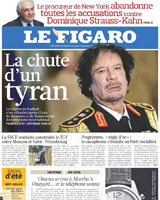
In the Corriere della Sera, commentator Antonio Ferrari, however, invites the European Union “not to stand on the sidelines as a spectator” of the changes rolling through the Arab world. “What is happening in the Arab world,” he writes, “should spread the conviction that the ‘spring revolutions’ can be transformed into a genuine opportunity and encourage countries to grasp it. Our immediate neighbours would benefit – and so would we.”
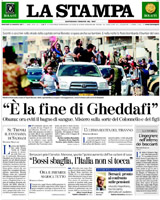
Paris and Rome are also bumping shoulders over post-Gaddafi Libya on a commercial level, particularly when it comes to petrol, notes the paper, which observes in a headline that “France and Italy aim to tank up on Libyan gas.” On the other hand, “Russia, China and Brazil,” whose oil companies were operating in Libya and who were opposed to military intervention, “may pay a high price.”
Do you like our work?
Help multilingual European journalism to thrive, without ads or paywalls. Your one-off or regular support will keep our newsroom independent. Thank you!













